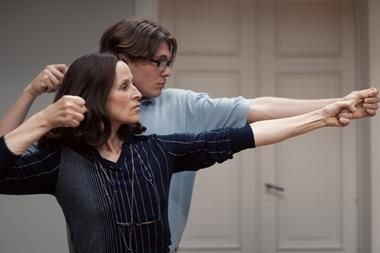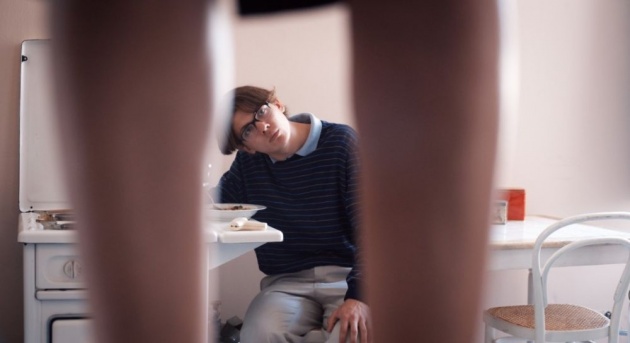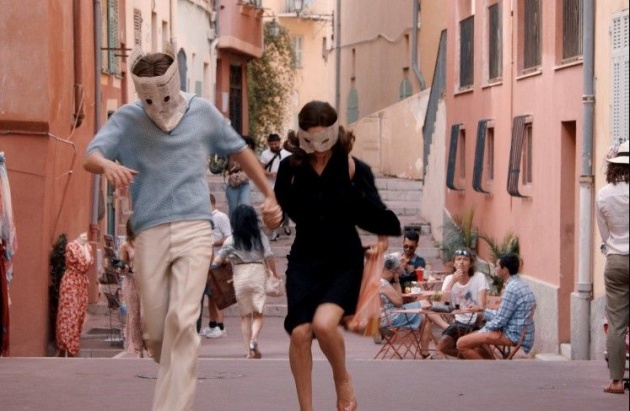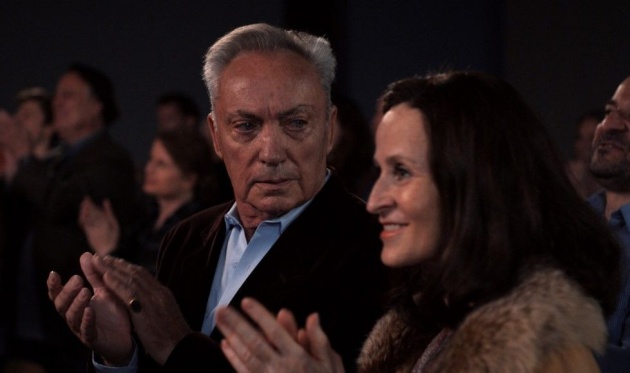
Pictured: 'Words should be launched like arrows'. Anna (Sophie Rois, foregrounded) teaches Adrian (Milan Herms) to land his dialogue in a scene from the German romantic comedy, 'A E I O U - A Quick Alphabet of Love', written and directed by Nicolette Krebitz. Still courtesy of Komplizen Film (DE)
A frivolously enjoyable if slight ‘odd couple’ romantic comedy, German writer-director Nicolette Krebitz’s fourth feature, A E I O U – Das Schnelle Alphabet der Liebe (A E I O U – A Quick Alphabet of Love) wears its subversion lightly. Ageing widowed actress Anna (Sophie Rois) reluctantly agrees to offer a juvenile purse snatcher, Adrian (Milan Herms) speech therapy to help him with an upcoming theatrical performance. The young man becomes obsessed and leads Anna into a life of crime on the French Riviera, until the law catches up with them.
Krebitz, primarily an actress with more than sixty credits, doesn’t have a particularly satirical eye. At a certain point, she – and we – forget that her protagonist is an actress with a keen awareness of cliché, including the relationship in which Anna finds herself. There is some enjoyment in seeing an older woman find pleasure with a younger man, but at no point is the source of Adrian’s delinquency dealt with.
The film begins with Anna behind glass being instructed by a French policeman (Nicolas Bridet) to pick out a man in an identity parade. Each of the men holds up a letter, the five vowels of the title. (Would not a better English title have been Vowel Play?) The men in the parade re-order themselves in alphabetical order – cue mild chuckles from the audience. Anna struggles to pick one of them out. Krebitz’s inserts a shot of Anna and a young man making love. Fantasy or something else?
At first, we think this parade is connected to a crime committed in the next scene, in which Anna has her handbag snatched. A young couple (Lilith Stangenberg and Adrian Lemande) pursue the man, who is in fact the bespectacled Adrian. After a vigorous chase, he is cornered in an alley. The young woman asks Adrian to throw the bag. Her partner appears behind her. Adrian complies. ‘Now, get lost,’ the young woman tells him. Anna is pleased to get her bag back, though her purse is gone, as she commiserates with her landlord, Michel (Udo Kier). We next see her in a dubbing theatre, working next to a man her age. They are recording a scene of ripening passion. The first take is a little stiff. The director asks the two actors to try again. When the male actor puts his hand on Anna’s knee, she is appalled, complains that he is perverted and abandons the microphone. Her outrage is a source of laughter.
Anna is asked by her agent to help a young man from a disadvantaged background with his speech. Initially reluctant – she does not consider herself a teacher – she agrees. Later, Adrian arrives at her Berlin apartment building, helpfully directed by Michel as he climbs the stairs.
The first session goes surprisingly well. Anna throws herself into pronunciation, beginning with ‘Aha’. It is clear that giving instruction brings her to life, rather like an ageing choreographer coaxing a young ballerina into dancing Swan Lake. Only Adrian has to perform a few lines. At one point, Anna crooks her arm as if holding an imaginary bow just before releasing an arrow. She encourages Adrian to do the same. Two hours pass very quickly, as noted first in Anna’s voiceover and then in dialogue. At no point is the bag theft discussed. Adrian recognises Anna, but she does not remember him.
In rehearsal, Adrian holds out his arm, palm raised in a ‘stop’ gesture. It is one of the positions that Anna taught him. Adrian’s director asks him to maintain the gesture (‘it’s powerful’) and asks him to say his lines. Adrian does so and stammers. The actors around him laugh. The director is nevertheless impressed; Adrian is making progress.

Pictured: 'Are you trying to distract me from my soup?' Adrian (Milan Herms) in a scene from the German romantic comedy, 'A E I O U - A Quick Alphabet of Love', written and directed by Nicolette Krebitz. Still courtesy of Komplizen Film (DE).
Before long, Adrian is bold enough to ask Anna to make him some soup and admires her legs (The Graduate-style) as he reaches for something on a shelf. Arriving for further session, Adrian has his arms across his chest, concealing his hands inside his jacket. Once in Anna’s apartment, he releases two doves. Krebitz shows us this in slow motion and sets it to syrupy music. The birds flutter around the room. Anna and Adrian crane their heads upwards. This is Adrian’s grand romantic gesture, though of course not very practical – birds need to be fed. (Later, we see that Anna has acquired a cage.)
Adrian’s performance – as watched by Anna and Michel – goes well. It is one of those experimental, didactic shows where young cast members hold up placards. Adrian’s speech appears to break convention, aimed directly at the audience. Krebitz doesn’t satirise the earnestness of the production, but it feels like the kind of work that gives theatre a bad name.
Her job done, there is no reason for Anna and Adrian to meet. At a certain point, he disappears. Anna is worried about his exam results, whether he will be able to go to university. She visits his school and enquires about his whereabouts. Eventually, she finds him on some steps, smoking outdoors with two other young men. She embarrasses him with a speech expressing how she knows things are hard for him. Adrian stands up and spits in her face. She does not berate him for this.
It isn’t long before he is outside her apartment building shouting her name. The spitting incident behind them, Adrian buys (or steals) Anna a new handbag that they admire in a shop window – he cannot bear to look at the old one; of course, it reminds him of his crime. Then he decides to take her on a railway journey. They end up in the South of France. ‘Oh, look, a casino,’ Anna says excitedly as they look out onto a beach. They check into a hotel, then enjoy a snack at a café. Anna reads a newspaper. Adrian takes it from her and cuts two holes, demonstrating that he can watch what is going on while having the paper in front of his face. Before long, they are both in the street wearing masks made of newspaper, stealing young women’s purses. Crime at its most romantic is, of course, still crime.

Pictured: Paper hearts. Adrian (Milan Herms) and Anna (Sophie Rois) in a scene from the German romantic comedy, 'A E I O U - A Quick Alphabet of Love', written and directed by Nicolette Krebitz. Still courtesy of Komplizen Film (DE).
After the previous day’s thievery, Adrian awakens early and goes out for a walk, stealing a young woman’s jewellery case as she checks out of a hotel. However, he is unable to open it. Taking an elevator to the fifth floor and entering a hotel room, swiping a coffee pot on the way, he drops the case from the balcony. It bursts open. He then makes his way downstairs and collects up the case’s contents. A young blonde-haired woman stares but doesn’t stop him. Adrian returns to his hotel room with coffee, croissants and a necklace for Anna. She doesn’t ask where he got it.
In the film’s climax, Anna tries to take Adrian with her into a casino. Only he is too young. She is offered a place – and some chips – at the roulette table. Her necklace attracts attention. A man sidles next to her and tells her in English that she is under arrest. Adrian watches from a distance as she is taken away in a police van. He returns to their hotel and sees police outside. He sleeps near the beach and is moved on the next morning by the local gendarmerie. Under interrogation, Anna claims to know nothing about the young man who brought her jewellery. He is however part of the identity parade. Anna feigns being unable to pick him out.
Returning to Berlin, Anna is consoled by Michel. There is, however, a happy ending.

Pictured: Michel (Udo Kier) and his friend and tenant Anna (Sophie Rois) in a scene from the German romantic comedy, 'A E I O U - A Quick Alphabet of Love', written and directed by Nicolette Krebitz. Still courtesy of Komprizen Film (DE)
The film’s best scene occurs early on when Anna hands Adrian a video tape to watch. In it, a younger Anna is interviewed by two middle-aged men, both smoking, who compliment her on her looks. Anna objects vociferously. Were she a male actor, the interviewer would not comment on her appearance. They argue. Adrian doesn’t watch the whole of the interview but instead asks why Anna showed it to him. Anna doesn’t want to be admired for her looks, which have faded a little – she is thin and lithe, though her face is gaunt. Adrian also enquires about Anna’s husband. ‘He hung himself,’ she explains, gesturing to the room where she discovered him. The scene illustrates Anna’s melancholy; life being outside her control. Anna is also the type of woman who has a large black and white photograph of her younger self on the wall; this (unfortunately) put me in mind of Stardust Memories, with a wall used to display a large photograph of the ‘My Lai’ massacre.
As other reviewers have noted, ‘A’ is the main vowel under consideration, with its connotation with the expression of orgasm. ‘E’ reflects the film’s energy. ‘I’, the occasional narration, ‘O’ the response when Anna throws something out of her window that ends up in her landlord’s garden. ‘U’ is the feeling of being underwhelmed. Noting that Maren Ade was one of the film’s producers, I would rather watch a follow-up to Ade’s film, Toni Erdmann. Alas, this is not on the horizon.
Reviewed at Edinburgh International Film Festival, Tuesday 16 August 2022, Filmhouse Screen 3, 14:00 screening



